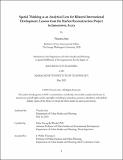| dc.description.abstract | This thesis examines transcalar tensions that emerge from urban infrastructure development projects funded through bilateral foreign assistance mechanisms. Using a mixed-methods case study approach to gather data from a wide variety of historical and contemporary primary and secondary sources, this research centers a harbor revitalization and port reconstruction project in Jamestown, a historic fishing community in Accra, Ghana. Having coordinated plans with the Ghanaian national government, a Chinese state-owned construction firm began working on the port in 2020. In 2024, the revitalized harbor and expanded port were officially handed over to the government of Ghana in a widely attended ceremony. The spatial implications of this physical urban infrastructure project across international, national, municipal, and local levels are complex and interrelated. Therefore, this case study is especially relevant at a historical moment when the nature of bilateral engagement may be undergoing significant transformation.
This thesis argues that spatial thinking, a foundational concept in urban planning, is a necessary analytical lens to incorporate within international development practice. Despite its relevance, spatial thinking has not been meaningfully incorporated into international development policy or implementation. Therefore, this thesis seeks to bridge epistemic gaps between urban planning and international development by advancing a spatial thinking framework, adapted for use in international development contexts. In doing so, this thesis envisions a future for bilateral development assistance that delivers equitable and sustainable development outcomes across scales of engagement. This approach, rooted in spatial thinking, intends to respond to local community needs and aspirations, capacitate municipal governments, align with national priorities, and accommodate geopolitical dynamics that facilitate bilateral project implementation. | |
